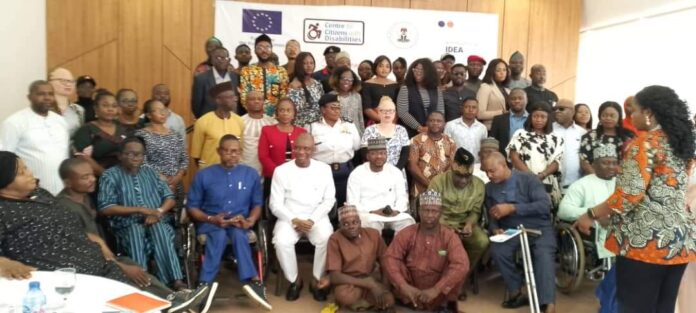The founder, Centre for Citizens With Disabilities (CCD), David Obinna Anyaele has passed a lot of accolades to The Rule Of Law And Anti-Corruption (ROLAC) Programmes for their role in the passage of Discrimination Against Persons With Disabilities (Prohibition) Act 2018.
Mr David while welcoming dignitaries and participants at the opening ceremony of The 3 Day Event to Commemorate The 5th Anniversary Of The Passage of National Disability Act on Tuesday in Abuja, expressed gratitude to ROLAC for supporting CCD to ensure the passage of Disability Act and its implementation.
The 5th Anniversary of the passage of the Discrimination Against Persons with Disabilities (Prohibition) Act, 2018 with The theme for the anniversary is Beyond Moratorium: Setting Agenda towards effective implementation of the national disability law.
According to Mr. David, “The aim of the event is to take stock on the level of implementation of the National Disability Act, create opportunities for learning and sharing of experiences amongst various stakeholders with a view to stimulating, motivating, promoting, and advocating for increased support and comprehensive implementation of the Act.
He informed that the gathering was made possible by the Rule of Law and Anti-Corruption (ROLAC) Programme of the International IDEA with funding from the European Union.
“Permit me to state that the passage of this Act and implementation of its key sections was made possible by ROLAC. Till this date what we are seeing today is the commitment and deliberate resolve of the leadership and management of ROLAC Programme to ensure that not a single section of the Act is left behind in its implementation’
“Since 2020, CCD has continued to provide a platform for stakeholders to convene to have a conversation on the journey so far in the implementation of the Nigeria Disability Law”.
“The motive behind this effort stems from the understanding that this law is not the first law in Nigeria that provides for the welfare of the vulnerable group as such, the chances are high that its implementation may be less important to the government. This concern is deeply rooted in the fact that the development and the passage of the law was led by civil society groups (organisations of persons with disabilities).
The question today is: To what extent are people with disabilities benefiting from the provisions of the Act?
What is the state of access to public buildings in Nigeria and Abuja FCT in particular?
Can we say that the level of discrimination against persons with disabilities in Nigeria has reduced?
What about the issue of inclusion of PWDs in government programs and activities? I don’t want to forget the issue of the 5% minimum reservation for persons with disabilities. Are PWDs getting jobs based on the provisions of the Act? These, and many more are some of the questions we need to be asking ourselves as we interact on this occasion.
Speaking further, he said that 60 months have come and gone since the passage of the Act. That means that the moratorium has come to an end. What are we going to do?
He informed that more than 19 States have passed different versions of the disability Act. At the State level, can we say that there is significant change in the quality of lives of PWDs in these States?
Therefore, the week’s event provides us an opportunity to review our journey so far, and to ask ourselves the hard question of: To what extent have we invested towards achieving the objective of the Act. In the principle of nothing about us without us, I appeal to the stakeholders here to review and renew our commitment toward the attainment of the purpose of the disability act. The implementation of the disability Act would reduce inequality, poverty, and the historic exclusion and marginalization of over 30 million Nigerians with different forms of disabilities.


